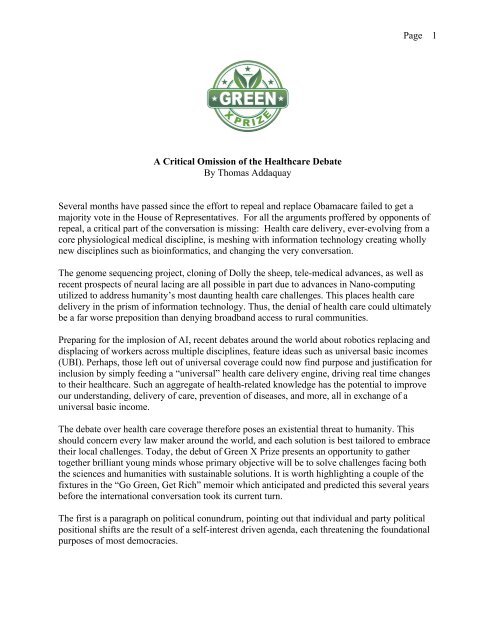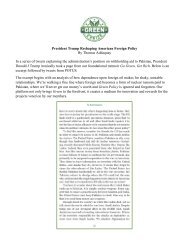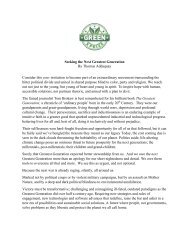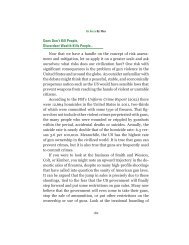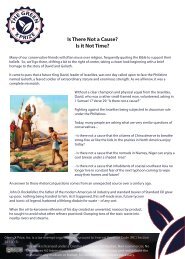A Critical Omission of the Healthcare Debate
Create successful ePaper yourself
Turn your PDF publications into a flip-book with our unique Google optimized e-Paper software.
Page 1<br />
A <strong>Critical</strong> <strong>Omission</strong> <strong>of</strong> <strong>the</strong> <strong>Healthcare</strong> <strong>Debate</strong><br />
By Thomas Addaquay<br />
Several months have passed since <strong>the</strong> effort to repeal and replace Obamacare failed to get a<br />
majority vote in <strong>the</strong> House <strong>of</strong> Representatives. For all <strong>the</strong> arguments pr<strong>of</strong>fered by opponents <strong>of</strong><br />
repeal, a critical part <strong>of</strong> <strong>the</strong> conversation is missing: Health care delivery, ever-evolving from a<br />
core physiological medical discipline, is meshing with information technology creating wholly<br />
new disciplines such as bioinformatics, and changing <strong>the</strong> very conversation.<br />
The genome sequencing project, cloning <strong>of</strong> Dolly <strong>the</strong> sheep, tele-medical advances, as well as<br />
recent prospects <strong>of</strong> neural lacing are all possible in part due to advances in Nano-computing<br />
utilized to address humanity’s most daunting health care challenges. This places health care<br />
delivery in <strong>the</strong> prism <strong>of</strong> information technology. Thus, <strong>the</strong> denial <strong>of</strong> health care could ultimately<br />
be a far worse preposition than denying broadband access to rural communities.<br />
Preparing for <strong>the</strong> implosion <strong>of</strong> AI, recent debates around <strong>the</strong> world about robotics replacing and<br />
displacing <strong>of</strong> workers across multiple disciplines, feature ideas such as universal basic incomes<br />
(UBI). Perhaps, those left out <strong>of</strong> universal coverage could now find purpose and justification for<br />
inclusion by simply feeding a “universal” health care delivery engine, driving real time changes<br />
to <strong>the</strong>ir healthcare. Such an aggregate <strong>of</strong> health-related knowledge has <strong>the</strong> potential to improve<br />
our understanding, delivery <strong>of</strong> care, prevention <strong>of</strong> diseases, and more, all in exchange <strong>of</strong> a<br />
universal basic income.<br />
The debate over health care coverage <strong>the</strong>refore poses an existential threat to humanity. This<br />
should concern every law maker around <strong>the</strong> world, and each solution is best tailored to embrace<br />
<strong>the</strong>ir local challenges. Today, <strong>the</strong> debut <strong>of</strong> Green X Prize presents an opportunity to ga<strong>the</strong>r<br />
toge<strong>the</strong>r brilliant young minds whose primary objective will be to solve challenges facing both<br />
<strong>the</strong> sciences and humanities with sustainable solutions. It is worth highlighting a couple <strong>of</strong> <strong>the</strong><br />
fixtures in <strong>the</strong> “Go Green, Get Rich” memoir which anticipated and predicted this several years<br />
before <strong>the</strong> international conversation took its current turn.<br />
The first is a paragraph on political conundrum, pointing out that individual and party political<br />
positional shifts are <strong>the</strong> result <strong>of</strong> a self-interest driven agenda, each threatening <strong>the</strong> foundational<br />
purposes <strong>of</strong> most democracies.
Page 2<br />
“Take, for instance, 2012 GOP nominee Mitt Romney. Following <strong>the</strong> killings in a movie<br />
<strong>the</strong>ater in Aurora, Colorado, Romney <strong>of</strong>fered a tepid response to <strong>the</strong> question <strong>of</strong> whe<strong>the</strong>r<br />
<strong>the</strong> country should enact new gun laws. Whe<strong>the</strong>r Romney himself believes that US<br />
citizens should be allowed to own arsenals <strong>of</strong> semi-automatic weapons does not matter.<br />
Modern politics dictated <strong>the</strong> thing that mattered in that moment: Romney did not want to<br />
upset or alienate <strong>the</strong> National Rifle Association. And he certainly didn’t want to lose <strong>the</strong>ir<br />
financial support.<br />
My intention is not to pick on Romney or even <strong>the</strong> conservative right. What I am<br />
demonstrating is that even in <strong>the</strong> case <strong>of</strong> a politician who believes that green initiatives<br />
are important for a healthier economy and environment, change might not occur because<br />
<strong>of</strong> political influence. Instead, many politicians have been indoctrinated to rally behind<br />
big oil and eschew everything that even suggests <strong>the</strong> introduction <strong>of</strong> greening. Politicians<br />
will always abhor polices that are good for <strong>the</strong> planet or o<strong>the</strong>rwise, if <strong>the</strong>y do not fit into<br />
<strong>the</strong> core principles <strong>of</strong> <strong>the</strong>ir political party or <strong>the</strong> sources <strong>of</strong> <strong>the</strong>ir financial backing.<br />
It is not just politicians who suffer from self-centeredness. Take anyone you like from<br />
any background and you will find that <strong>the</strong>ir chief priority is looking out for <strong>the</strong>mselves.<br />
There is not anything inherently wrong in this; self-preservation is important. But, it is<br />
also important to consider <strong>the</strong> larger world.<br />
Imagine a bartender in a big city. Suppose his family has worked in <strong>the</strong> retail distribution<br />
<strong>of</strong> liquor for at least a generation. Having grown up in and around a bar, we can guess a<br />
few things about his background and perspectives. If it is a seedy bar, he might hold a<br />
worldview steeped heavily in <strong>the</strong> realities <strong>of</strong> <strong>the</strong> underground. He has seen his fair share<br />
<strong>of</strong> addicts and drug dealers, prostitutes and pimps, perhaps bookies and hit men and all<br />
o<strong>the</strong>r sorts <strong>of</strong> <strong>the</strong> criminal element. We surmise that he has likely seen and served many<br />
alcoholics, and even though he knows drinking is harmful to <strong>the</strong>m, he will continue to<br />
serve <strong>the</strong>m liquor because he is more interested in <strong>the</strong> welfare <strong>of</strong> his family’s business<br />
than his patrons’ health.<br />
Similarly, when a person is elected to <strong>of</strong>fice, he does not change his stripes. He continues<br />
to compromise <strong>the</strong> welfare <strong>of</strong> his constituents in <strong>the</strong> same way that <strong>the</strong> bartender compromises<br />
<strong>the</strong> welfare <strong>of</strong> <strong>the</strong> alcoholics in <strong>the</strong> bar. His voice will sound human and caring,<br />
but his actions will be fruitless and unproductive. His drive will be to speak as powerfully<br />
or as meekly as <strong>the</strong> circumstances require, to safeguard <strong>the</strong> interest <strong>of</strong> <strong>the</strong> party and to get<br />
paid generously by special interest groups, while ignoring <strong>the</strong> needs <strong>of</strong> his constituents.<br />
So here we have <strong>the</strong> primary problem, <strong>the</strong> ultimate political conundrum: how to make<br />
hundreds <strong>of</strong> self-serving politicians look beyond <strong>the</strong>ir immediate personal interests and<br />
start doing things that benefit <strong>the</strong> world at large? With so few substantial green<br />
technology patrons available and able to buy <strong>the</strong> loyalty <strong>of</strong> <strong>the</strong> people in power, it is<br />
likely to be an up- hill battle. Until <strong>the</strong>n, politicians will likely maintain <strong>the</strong>ir course,<br />
upholding unsustainable, environmentally damaging, economically draining, and national<br />
security-threatening energy policies.” (Addaquay, 2017)
Page 3<br />
In addition to this example from <strong>the</strong> book, we found such positional changes employed skillfully,<br />
if unexpectedly, by none o<strong>the</strong>r than <strong>the</strong> president <strong>of</strong> <strong>the</strong> United States himself.<br />
(goo.gl/4kXAGY)<br />
As <strong>the</strong> healthcare debate raged on, after <strong>the</strong> eventual rejection <strong>of</strong> Trump Care, pundits were<br />
quick to point out that <strong>the</strong> U.S was ceding power to China. We have <strong>the</strong>oretical anecdotes<br />
favoring that possibility, with <strong>the</strong> U.S eventually ceding economic supremacy to China. Much as<br />
Great Britain ceded economic power to <strong>the</strong> United States, as Adam Smith so long ago predicted<br />
would occur, pointing to <strong>the</strong> clumsy and expensive nature <strong>of</strong> British colonization, compared to<br />
<strong>the</strong> United States’ embrace <strong>of</strong> wealth acquisition through corporations. Smith accurately<br />
forecasted <strong>the</strong> end <strong>of</strong> Great Britain as an economic super power.<br />
“Consider <strong>the</strong> Occupy movement. What began as a peaceful demonstration against Wall<br />
Street on September 17, 2011, grew into massive protests in more than 600 communities<br />
across <strong>the</strong> country. Given <strong>the</strong>se numbers, politicians and business leaders should count<br />
<strong>the</strong>mselves lucky, as protests today look far different than <strong>the</strong>y did at <strong>the</strong> time <strong>of</strong> <strong>the</strong><br />
American Revolution, when public beatings, imprisonment, and wanton destruction <strong>of</strong><br />
property were <strong>the</strong> norm. The substantial turnout <strong>of</strong> <strong>the</strong> so-called “99-percenters”<br />
represents what I believe to be a sign that <strong>the</strong> US and <strong>the</strong> world must brace for dramatic<br />
change. This is no blip in <strong>the</strong> economic cycle. We are on <strong>the</strong> cusp <strong>of</strong> a new epoch <strong>of</strong><br />
wealth creation which we have not seen before, at least not since <strong>the</strong> Industrial<br />
Revolution.<br />
I will demonstrate <strong>the</strong> parallels between <strong>the</strong> economic and social upheaval that led to <strong>the</strong><br />
collapse <strong>of</strong> empires, and <strong>the</strong> rise <strong>of</strong> industry and <strong>the</strong> new frontier <strong>of</strong> individual wealth<br />
creation rendered possible by recent advancements in consumer technology. In short, if<br />
we examine <strong>the</strong> sum <strong>of</strong> American economic history, what we will find is that this country<br />
has experienced three distinct eras <strong>of</strong> wealth generation:<br />
1) The first period saw <strong>the</strong> creation <strong>of</strong> wealth solely at <strong>the</strong> nation-state level. This was <strong>the</strong><br />
age <strong>of</strong> empires, wherein sovereign nations used <strong>the</strong>ir military advantage to amass<br />
economies steeped in gold and silver.<br />
2) The second era would be known as <strong>the</strong> Industrial Revolution, a time when <strong>the</strong><br />
dynamics <strong>of</strong> wealth creation were increasingly privatized due to changes in economic<br />
thinking and <strong>the</strong> development <strong>of</strong> mass production.<br />
3) The third and latest era has been borne <strong>of</strong> technological advancement, as key<br />
developments <strong>of</strong> consumer technology have led directly to substantial wealth creation.<br />
What was once attainable only for a nation-state became possible for a powerful<br />
corporation. What was once only possible for a titan possessed <strong>of</strong> a massive workforce<br />
and tremendous control over raw materials became possible for any basement<br />
programmer with a great idea. King George became John D. Rockefeller, who became<br />
Mark Zuckerberg. As with Smith’s Theory <strong>of</strong> Moral Sentiments, first published in 1759,
Page<br />
4<br />
and <strong>the</strong> concept <strong>of</strong> assembly-line labor, <strong>the</strong> current model <strong>of</strong> wealth creation is in need <strong>of</strong><br />
a new and powerful idea to render it stable. We need an idea that will make individual<br />
wealth creation more accessible to <strong>the</strong> common man, an idea that will take this<br />
tumultuous world economy and turn it on its head for <strong>the</strong> better.<br />
In 1776, <strong>the</strong> world economy was shifting toward a new world order. Advances in<br />
technology and economic thinking paved <strong>the</strong> way for a new, privatized, model <strong>of</strong> wealth<br />
creation, placing it in <strong>the</strong> hands <strong>of</strong> industrial titans. While economic disparity <strong>of</strong>ten leads<br />
to social, political, and economic change, it also sometimes leads to a gradual and<br />
relatively peaceful decline. Consider what happened to <strong>the</strong> British Empire following <strong>the</strong><br />
American and Industrial Revolutions. The Empire declined greatly over <strong>the</strong> century that<br />
followed. Britain’s cost <strong>of</strong> support and control had become too substantial for it to sustain<br />
its sprawling territories.<br />
Whenever structural economic change happens, <strong>the</strong> legislative branch <strong>of</strong> government<br />
loses its prioritizing capabilities. This was evident during England’s transition from a<br />
nation with military priorities to a country with industrial imperatives. The Great<br />
Depression ushered in social changes that made taxes increasingly necessary, due to <strong>the</strong><br />
increased cost <strong>of</strong> social programs and <strong>the</strong> size <strong>of</strong> <strong>the</strong> government. Since <strong>the</strong> Great<br />
Recession <strong>of</strong> 2008, <strong>the</strong>re has been some confusion in <strong>the</strong> priorities <strong>of</strong> our legislative<br />
branch, to say <strong>the</strong> least.<br />
Today, <strong>the</strong> US may succumb to a similar fate. The world’s new economic power appears<br />
to be China, while <strong>the</strong> US appears to be fading and becoming dependent on China.<br />
Unless this country can come to embrace new economic principles and technologies, it<br />
stands to go <strong>the</strong> way <strong>of</strong> <strong>the</strong> British Empire.<br />
Without a new brand <strong>of</strong> economic, political, and social thinking, <strong>the</strong> Great Recession may<br />
never truly end. This is why a new way <strong>of</strong> earning wealth is so important.” (Addaquay,<br />
2017)<br />
As you embark on this journey, bear in mind that future innovations will go a long way towards<br />
eventually healing our planet. We hope to sustain <strong>the</strong> rewards monthly, after <strong>the</strong> maiden winner<br />
is announced. Good luck and may <strong>the</strong> best person/team win.<br />
Green X Prize<br />
www.greenxprize.com<br />
This work is licensed under a Creative Commons Attribution, Non-Commercial, No Derivatives 4.0 International License.<br />
Please feel free to copy and redistribute <strong>the</strong> material in any medium or format. No written or oral consent necessary.


